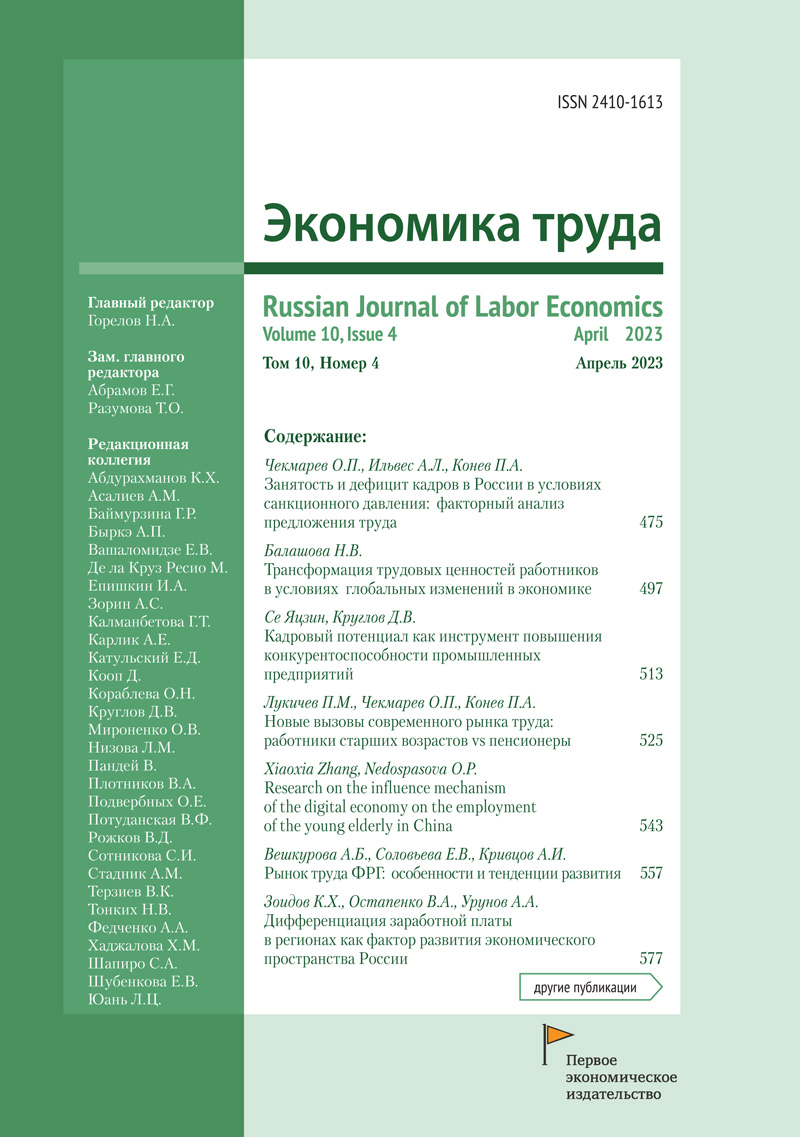The German labor market: characteristics and trends
- Authors: Veshkurova A.B.1, Solovyeva E.V.2, Krivtsov A.I.3
-
Affiliations:
- The Financial University under the Government of the Russian Federation
- Russian University of Transport
- MGIMO University
- Issue: Vol 10, No 4 (2023)
- Pages: 557-576
- Section: Articles
- URL: https://journals.eco-vector.com/2410-1613/article/view/607793
- DOI: https://doi.org/10.18334/et.10.4.117553
- ID: 607793
Cite item
Abstract
Demographic trends in Germany are similar to those in Russia. Therefore, it is interesting to study the experience of the advanced European economy in the context of a workforce reduction.Based on Eurostat data, the authors have studied demographic trends and migration policy in Germany and the impact of the Covid-19 pandemic on the labor market. Germany's new employment policy has successfully coped with the financial crisis of 2008-2009, as well as the challenges of the Covid-19 pandemic. In addition, Germany is actively introducing digital technology into the economy, being currently the most automated economy in the EU.The results of the study can be used by the executive authorities of the federal and regional levels in the preparation of measures to support employment. Studying the German experience of employment regulation is also useful for other countries, especially given the slowdown in the global economy against the background of the energy crisis.
About the authors
Alina Borisovna Veshkurova
The Financial University under the Government of the Russian Federation
Email: veshenka@bk.ru
Elena Valentinovna Solovyeva
Russian University of Transport
Email: slvvev@yandex.ru
Artem Igorevich Krivtsov
MGIMO University
Email: a.krivtsov@inno.mgimo.ru
References
- Bonin J.P., Putterman L. Economics of Cooperation and the Labour-Managed Economy. - London: Routledge, 2013. – 200 p.
- Zeitreihen. Bundesagentur fur Arbeit. Statistik. [Электронный ресурс]. URL: https://statistik.arbeitsagentur.de/DE/Navigation/Statistiken/Interaktive-Statistiken/Zeitreihen/Lange-Zeitreihen-Nav.html (дата обращения: 12.08.2022).
- Eckwerte Arbeitsmarkt. Bundesagentur fur Arbeit. Statistik. [Электронный ресурс]. URL: https://statistik.arbeitsagentur.de/DE/Navigation/Statistiken/Interaktive-Statistiken/Eckwerte-Arbeitsmarkt/Dashboard-Eckwerte-Arbeitsmarkt-Nav.html (дата обращения: 12.08.2022).
- Digital skills use. Cedefop. [Электронный ресурс]. URL: https://www.cedefop.europa.eu/en/tools/skills-intelligence/digital-skills-use?year=2021#1 (дата обращения: 12.08.2022).
- Most requested skills in online job ads in Germany in Skills in 2021. Cedefop. [Электронный ресурс]. URL: https://www.cedefop.europa.eu/en/tools/skills-intelligence/countries?country=DEoccupation=§or=#7 (дата обращения: 12.08.2022).
- Christian Hutter, Enzo Weber Labour market effects of wage inequality and skill-biased technical change // Applied Economics. – 2022. – p. 1-22. – doi: 10.1080/00036846.2022.2108751.
- Christl M., De Poli S., Hufkens T. et al. The role of short-time work and discretionary policy measures in mitigating the effects of the COVID-19 crisis in Germany // International Tax and Public Finance. – 2022. – doi: 10.1007/s10797-022-09738-w.
- Dauth Wolfgang, Findeisen Sebastian, Südekum Jens, Wößner Nicole German robots: The impact of industrial robots on workers. IAB-Discussion Paper, No. 30/2017. [Электронный ресурс]. URL: https://www.econstor.eu/bitstream/10419/172894/1/dp3017.pdf (дата обращения: 15.08.2022).
- Digitization Index for Businesses 2021/2022: German Companies focus on Security, Sustainability and New Wor. Deutsche Telekom. [Электронный ресурс]. URL: https://www.telekom.com/en/media/media-information/archive/digitization-index-for-businesses-2021-2022-1003532 (дата обращения: 01.08.2022).
- Eichhorst W., Grienberger-Zingerle M., Konle-Seidl R. Activation Policies in Germany: From Status Protection to Basic Income Support. Docs.iza.org. [Электронный ресурс]. URL: https://docs.iza.org/dp2514.pdf.
- Esping-Andersen G. The Three Worlds of Welfare Capitalism. - Cambridge: Polity Press, 1990. – 260 p.
- Gartner H., Weber E. Einschätzung des IAB zur wirtschaftlichen Lage – Juli 2022. Iab-forum.de. [Электронный ресурс]. URL: https://www.iab-forum.de/einschaetzung-des-iab-zur-wirtschaftlichen-lage-juli-2022/ (дата обращения: 10.08.2022).
- Germany Population. Worldpopulationreview.com. [Электронный ресурс]. URL: https://worldpopulationreview.com/countries/germany-population (дата обращения: 12.08.2022).
- IAB-Arbeitsmarktbarometer. [Электронный ресурс]. URL: https://iab.de/daten/iab-arbeitsmarktbarometer-2/ (дата обращения: 12.08.2022).
- IFR presents World Robotics 2021 reports. Ifr.org. [Электронный ресурс]. URL: https://ifr.org/ifr-press-releases/news/robot-sales-rise-again (дата обращения: 12.08.2022).
- Sabine Klinger, Johann Fuchs Johann Fuchs Effects of population changes on the labour market in Germany. Iab-forum.de. [Электронный ресурс]. URL: https://www.iab-forum.de/en/effects-of-population-changes-on-the-labour-market-in-germany/ (дата обращения: 15.08.2022).
- Jantz Bastian, Jann Werner Mapping accountability changes in labour market administrations: From concentrated to shared accountability? // International Review of Administrative Sciences. – 2013. – № 2. – p. 227-248. – doi: 10.1177/0020852313477764.
- Part time employment, total (% of total employment) – Germany. Data.worldbank.org. [Электронный ресурс]. URL: https://data.worldbank.org/indicator/SL.TLF.PART.ZS?locations=DE (дата обращения: 15.08.2022).
- Population forecast for Germany from 2018 to 2060, by age group. Statista.com. [Электронный ресурс]. URL: https://www.statista.com/statistics/1127731/population-forecast-by-age-group-germany/ (дата обращения: 07.08.2022).
- Rinne U., Zimmermann K. F. Is Germany the north star of labor market policy? // IMF Economic Review. – 2013. – № 4. – p. 702-729. – doi: 10.1057/imfer.2013.21.
- Schneider H. Reformpolitik und institutioneller Wandel: Neue Chancen für benachteiligte Gruppen auf dem Arbeitsmarkt?. / In book: Zeitenwende auf dem Arbeitsmarkt: Wie der demografische Wandel die Erwerbsgesellschaft verändert. - Bonn: Bundeszentrale für politische Bildung, 2013. – 142-163 p.
- Wirtschaftliche Auswirkungen Statistiken mit Bezug zu COVID-19. Destatis.de. [Электронный ресурс]. URL: https://www.destatis.de/DE/Themen/Querschnitt/Corona/Wirtschaft/kontextinformationen-wirtschaft.html (дата обращения: 10.08.2022).
- Белов В.Б. Коронакризис versus cоциальное рыночное хозяйство и экономическое пространство германии // Современная Европа. – 2021. – № 4(104). – c. 58-70. – doi: 10.15211/soveurope420215870.
- Белов В.Б. Цифровая трансформация Германии в условиях коронакризиса // Научно-аналитический вестник Института Европы РАН. – 2021. – № 3(21). – c. 84-93. – doi: 10.15211/vestnikieran320218493.
- Вороненкова Г.Ф., Гапонова Е.М., Маслина М.Г., Христенко А.В., Юдов М.А. Цифровизация в Германии: вызовы и перспективы (к постановке проблемы) // Меди@льманах. – 2021. – № 3(104). – c. 104-115. – doi: 10.30547/mediaalmanah.3.2021.104115.
- Гагарина И., Князева И. Государственная конкурентная политика Германии: ответы на вызовы цифровизации экономики, уроки для России // Вестник Санкт-Петербургского университета. Экономика. – 2022. – № 4. – c. 551-580. – doi: 10.21638/spbu05.2022.404.
- Зарицкий Б.Е. Германская экономика: наследство А. Меркель // Мировая экономика и международные отношения. – 2021. – № 9. – c. 34-42. – doi: 10.20542/0131-2227-2021-65-9-34-42.
- Синдяшкина Е.Н. Государственная политика на рынке труда в странах ЕС: основные тенденции и направления трансформации // Социально-трудовые исследования. – 2022. – № 3(48). – c. 67-80. – doi: 10.34022/2658-3712-2022-48-3-67-80.
Supplementary files









